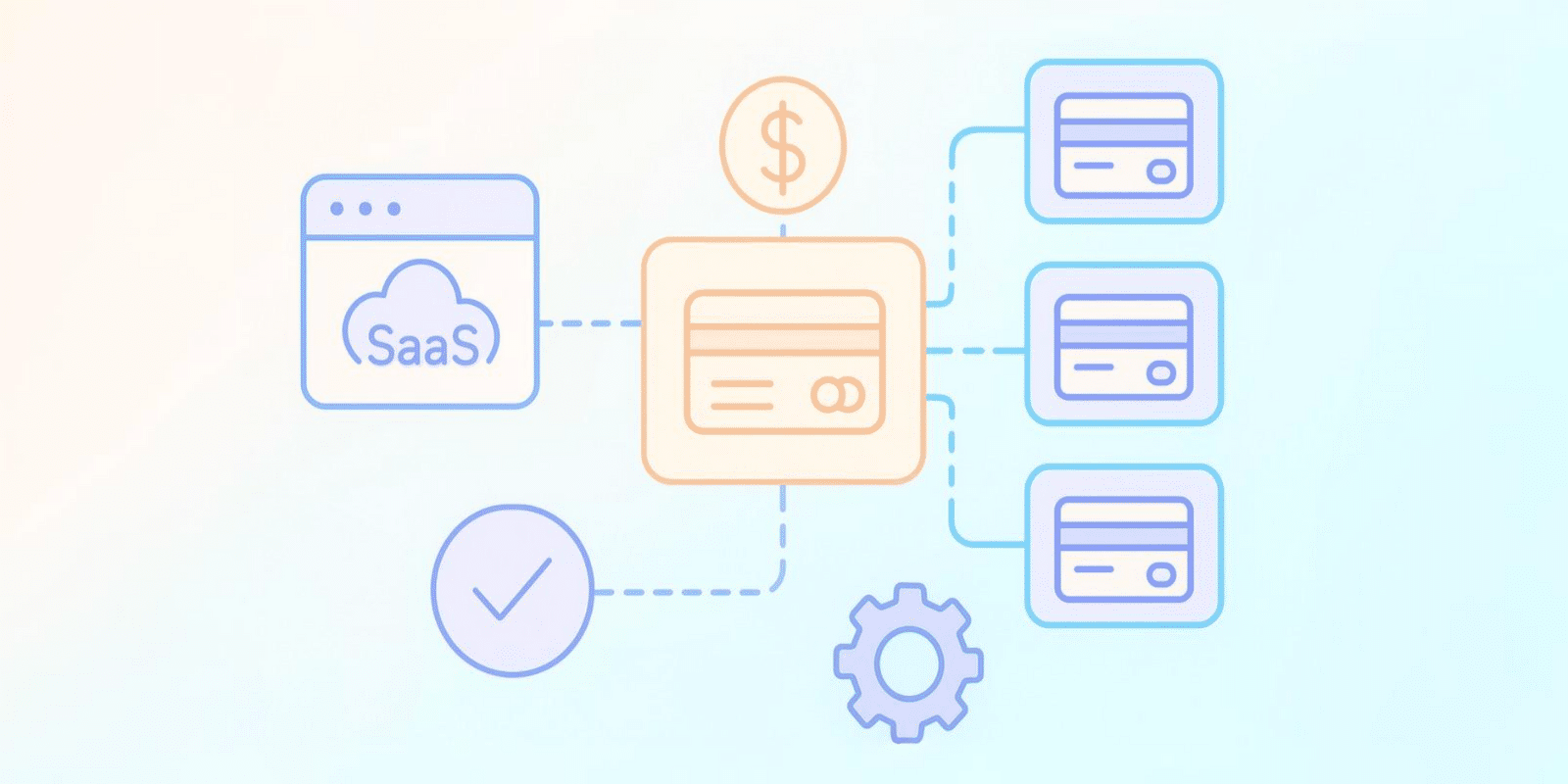Pagamentos SaaS
O que é um Sistema de Roteamento de Pagamentos para SaaS?

O que é um Sistema de Roteamento de Pagamentos para SaaS?
Um sistema de roteamento de pagamentos SaaS (também conhecido como plataforma de orquestração de pagamentos) é um software que direciona de forma inteligente os pagamentos dos clientes através do provedor de pagamento, gateway ou adquirente mais eficiente.
Diferentemente das plataformas de faturamento de assinaturas, que gerenciam o faturamento e as cobranças recorrentes, o roteamento de pagamentos foca em maximizar as taxas de sucesso de pagamento e minimizar os custos.
Estes sistemas são relevantes para empresas SaaS globais que processam volumes de transação significativos em várias regiões e moedas.
Por que o roteamento de pagamentos é importante para o SaaS?
O roteamento de pagamentos afeta diretamente a capacidade de uma empresa SaaS de coletar receita de forma consistente e expandir internacionalmente. A seleção automatizada de caminhos de pagamento pode afetar as taxas de sucesso das transações e os níveis de retenção de clientes.
Os principais benefícios incluem:
- Maiores taxas de sucesso de transações
- Redução da latência e dos erros de pagamento
- Menores custos de processamento através da seleção inteligente de provedores.
- Vantagem competitiva através de um checkout integrado
A implementação do roteamento inteligente pode estar relacionada com as taxas de recusa de pagamento, o que pode afetar a rotatividade de clientes e a receita entre as empresas de SaaS.
Que software é necessário para o roteamento de pagamentos SaaS?
Uma infraestrutura completa de pagamentos para SaaS geralmente inclui:
- Gateways de Pagamento – Capturar e transmitir com segurança as informações de pagamento do cliente.
- Processadores de Pagamento / Adquirentes – Executar a transação movimentando os fundos.
- Plataformas de Faturamento de Assinaturas – Gerenciar o faturamento recorrente, faturas, impostos e o reconhecimento de receita.
- Roteamento de Pagamentos / Camada de Orquestração – Decide qual gateway ou processador usar para cada transação.
Ao avaliar soluções, priorize:
- Dashboards e APIs fáceis de usar
- Fortes certificações de segurança e conformidade
- Amplo suporte para métodos de pagamento e moedas
- Suporte confiável do fornecedor
Que fatores as empresas SaaS devem considerar ao definir as regras de roteamento de pagamentos?
As regras de roteamento inteligentes são essenciais para maximizar o desempenho e a conformidade. Considere:
- Conformidade e Segurança
- Regulamentos locais (p. ex., PSD2 na Europa, PCI DSS para segurança de dados de cartão)
- Regras de reconhecimento de receita e obrigações fiscais
- Desempenho
- Monitorar o tempo de atividade do gateway e as taxas de sucesso
- Encaminhar pagamentos de alto risco ou alto valor através de fornecedores mais confiáveis
- Necessidades do cliente
- Corresponder tipos de pagamento (cartão de crédito, ACH, carteiras digitais) com o fornecedor de melhor desempenho
- Usar adquirência local para pagamentos internacionais para reduzir recusas
Como as empresas SaaS devem escolher as soluções de roteamento de pagamentos adequadas?
Ao selecionar uma plataforma, concentre-se em:
- Integração perfeita – Garanta a compatibilidade com sistemas de CRM, ERP e de faturamento.
- Múltiplos métodos de pagamento – Cartões, ACH, PayPal, carteiras digitais e métodos locais.
- Segurança Robusta – Conformidade com PCI, tokenização e ferramentas de prevenção de fraudes.
- Impacto nos Negócios – Avalie as taxas, os recursos de otimização de roteamento e os relatórios.
Que modelos de faturação são suportados pelas soluções de roteamento de pagamentos SaaS?
Embora o roteamento em si não gerencie a cobrança, as plataformas de orquestração geralmente se integram com sistemas de cobrança de assinaturas para oferecer suporte a:
- Assinaturas recorrentes (mensais, anuais)
- faturamento baseado no uso
- Preços por níveis ou por volume
- Compras únicas
- Modelos de preços híbridos e dinâmicos
Colaborando com um Merchant of Record permite que você tenha acesso a múltiplos serviços, incluindo precificação flexível, modelos de assinatura, roteamento de pagamentos SaaS e muito mais, a partir de um dashboard unificado. PayPro Global é um MOR confiável para SaaS, software e video games.
Quais são os desafios comuns na implementação do roteamento de pagamentos SaaS?
Mesmo com os benefícios, a implementação pode apresentar desafios:
- Complexidade de integração com as ferramentas de cobrança e CRM existentes
- Gestão de pagamentos falhados (por exemplo, novas tentativas, fluxos de trabalho de dunning)
- Obstáculos à globalização – múltiplas moedas e preferências de pagamento locais
- Conformidade contínua com regulamentações em rápida mudança
Se não forem gerenciados, esses elementos podem afetar a receita, a precisão dos relatórios e o status de conformidade.
Como é que o encaminhamento de pagamentos SaaS afeta a experiência de checkout do cliente?
Um sistema de roteamento bem implementado melhora o checkout ao:
- Reduzir as recusas e o atrito
- Acelerar a aprovação de transações
- Oferecer suporte a moedas e métodos locais
- Aumentar a confiança com pagamentos seguros и fluidos
Isso se traduz em menos carrinhos abandonados, mais conversões e maior fidelidade do cliente.
Conclusão
Um sistema de roteamento de pagamentos SaaS nem sempre é necessário para empresas em estágio inicial, mas torna-se essencial em escala, especialmente para empresas que operam internacionalmente ou lidam com grandes volumes de transações.
Ao entender as diferenças entre as plataformas de faturamento e os sistemas de roteamento/orquestração de pagamentos, as empresas de SaaS podem:
- Otimizar as taxas de sucesso de pagamento
- Melhorar a experiência do cliente
- Reduzir os riscos operacionais e de conformidade
- Impulsionar o crescimento de receita sustentável
O roteamento inteligente de pagamentos pode afetar a resiliência do negócio e o foco no cliente no competitivo setor de SaaS.